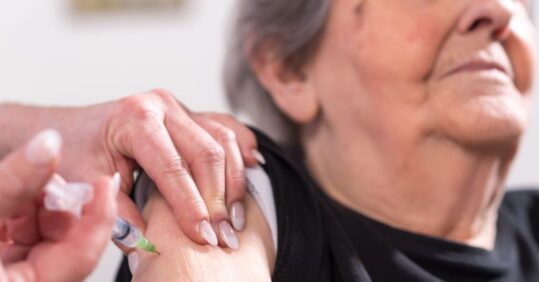Only most vulnerable may need Covid booster jab, says government adviser

A Covid booster jab may only be needed for people whose immune responses to the first two doses are likely to be inadequate, a government adviser has said.
Professor Adam Finn, a paediatrics professor at the University of Bristol who sits on the Joint Committee on Vaccination and Immunisation (JCVI), which advises the Government on vaccines, said it is ‘quite likely’ immunocompromised people will be advised to receive a booster vaccine dose.
But speaking to BBC Breakfast today, he stressed it is ‘still uncertain’ whether ‘a broader booster programme’ will be rolled out and whether all over-50s will be given a third shot.
Related Article: NHS 10-year plan: What does it mean for nursing?
It ‘quite likely’ the booster will be advised for a ‘small group of people’ with ‘inadequate’ immune responses to the first two vaccine doses, he said. This group may have immunosuppression because of immunodeficiency, cancer treatment or following organ or bone transplants.
He continued: ‘A broader booster programme is still uncertain. We’ve laid out potential plans so that the logistics of that can be put together, alongside the flu vaccine programme [but] we clearly don’t want to be giving vaccines to people that don’t need them.’
The booster vaccination programme is due to start on 6 September. But health and social care secretary Sajid Javid said on Tuesday the Government was awaiting on advice from the JCVI, although he indicated over-50s would probably be offered the jab at the same time as Covid boost.
In the same interview, Professor Finn explained over-16s have been advised to receive a first dose after some children developed severe illness from Covid and were admitted to intensive care.
Related Article: Funded nurse workforce plan needed for neighbourhood health services
But the JCVI are being ‘cautious’ about advising a second jab without more research into the rare side-effects of the Pfizer vaccine in the age group, he said. This includes cases of myocarditis – inflammation of the heart muscle – reported among young people in Israel and the United States.
Professor Finn explained: ‘We’re going cautiously down through the ages now into childhood and it was clear that the number of young people in the age group – 16, 17 – that were getting seriously ill merited going forward with giving them just a first dose.
‘The one thing that has made cautious and not to yet confirm when or what the second dose will be relates to the fact that we want to learn more about rare side-effects of the Pfizer vaccine, the one vaccine we can use at the moment in this age group.’
Related Article: Over one million children living in homes causing asthma and chronic illness
In May, Moderna also announced that its vaccine is effective in 12-18-year-olds after a study saw no cases of Covid-19 in those who had two doses, but it is yet to receive Medicines and Healthcare products Regulatory AgencyMHRA approval for this age group.
To complete relevant vaccinations and infections CPD modules on Nursing in Practice Learning, click here.

See how our symptom tool can help you make better sense of patient presentations
Click here to search a symptom




